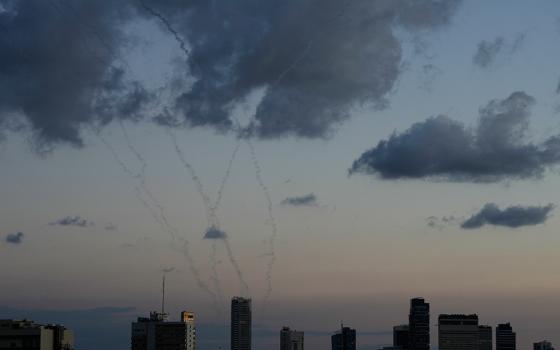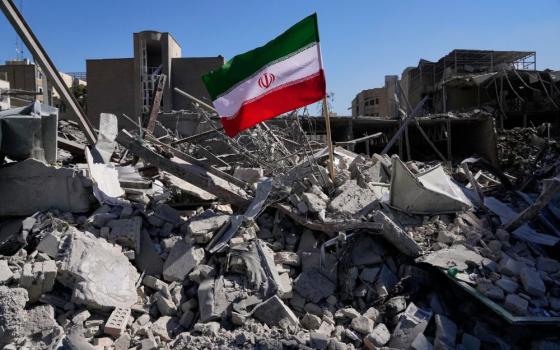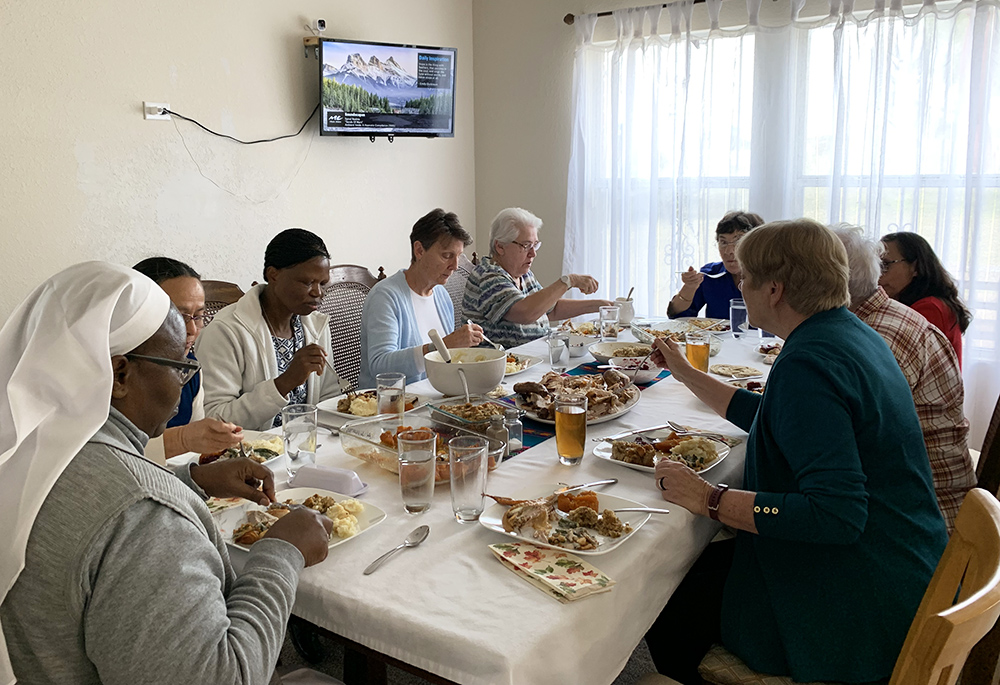
Sisters ministering to migrants in Texas' Rio Grande Valley gather with guests for Thanksgiving. Clockwise from left: SMH Sr. Beatrice Alaku; Sister of Charity of the Incarnate Word Marilu Yanes; Holy Cross Sr. Catherine Before; Immaculate Heart of Mary Sr. Mary Elaine Anderson; IHM Sr. Camille Brouillard; Mercy Sr. Theresa Saetta; Ruth Tiguila; IHM Sr. Rose Patrice Kuhn; and Mercy Sr. Patricia Mulderick. (Courtesy of IHM Sr. Elvia Mata)
When Mercy Srs. Patricia Mulderick and Theresa Saetta responded in early 2021 to the call for volunteers to help serve migrants and asylum-seekers at the U.S. border with Mexico, they were overwhelmed by the need they found waiting for them.
"Most of us have been in areas where we've experienced a lot of poverty," Mulderick said. "But to be honest, I don't think I ever saw anything like when we first went over to Reynosa."
The need was so great, in fact, that after they went back home, the thought wouldn't leave them that they needed to do more. So, by September of that year, they both moved to the McAllen, Texas, area to minister permanently.
In July 2022, Mulderick and Saetta were joined by three Sisters, Servants of the Immaculate Heart of Mary, who bought a house nearby. Sr. Mary Elaine Anderson, Sr. Rose Patrice Kuhn and Sr. Elvia Mata have since been joined by IHM Sr. Carmen Armenta.
Both groups of sisters deliberately bought houses larger than they need so they can accommodate volunteers or even groups wanting to come minister.
"It's four bedrooms and an office, and the office becomes a bedroom when needed," Mulderick said. "We wanted our house to be a place where people could come and become more aware of what's going on, on both sides of the border."
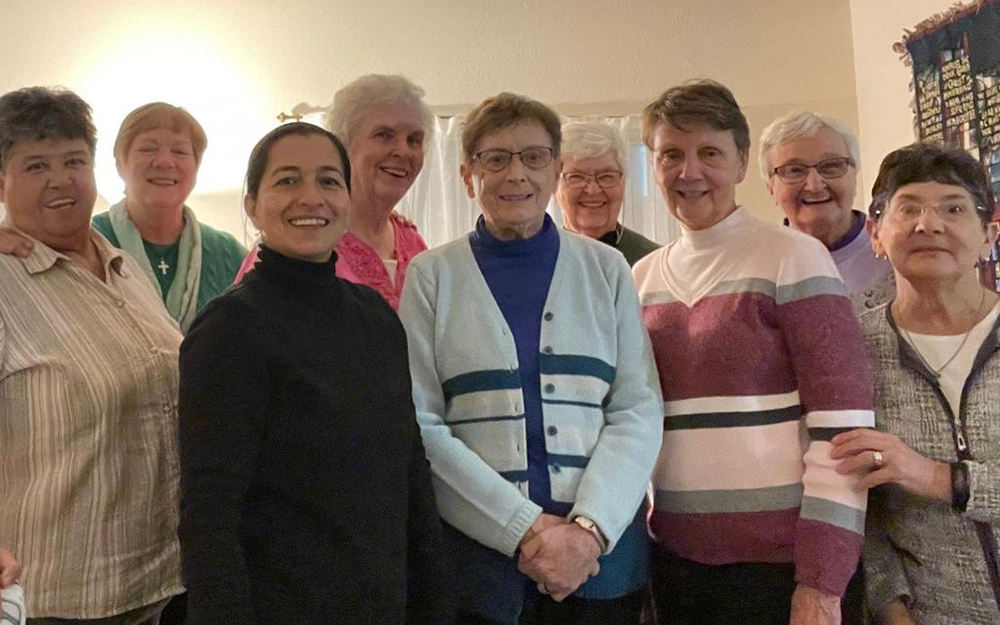
Sisters from several congregations who have moved to the Rio Grande Valley in Texas to minister to migrants in the area gathered to celebrate Thanksgiving together. (Courtesy of Immaculate Heart of Mary Sr. Rose Kuhn)
The IHM group is unique: The three IHM congregations in Monroe, Michigan; Scranton, Pennsylvania; and Immaculata, Pennsylvania, made the ministry a joint project. Mata and Armenta are from the Monroe community, Anderson is from Scranton and Kuhn is from Immaculata.
Anderson said getting the three leadership teams to agree was easy.
"As soon as it came up, the leadership was so open to it," she said. "But we had to figure out how to rent a house, what congregation's name it would be in — just the logistics were difficult. But we can do more together than we can do alone."
Both groups of sisters have received help and guidance from three Franciscan Sisters of Little Falls, Minnesota, who moved there several years before. Now, the nine sisters and two Jesuit priests in the area work together as often as they can. Bishop Daniel Flores of Brownsville also gathers all the religious in the diocese several times a year for support.
Advertisement
"When we first got here, we stayed with the Mercies for a couple of weeks," Kuhn said. "We were very grateful for that. We had a house, but we had no furniture yet."
Franciscan Sr. Pat Forster served at her congregation's mission in Mexico for 15 years before moving to the Rio Grande Valley in 2017. In 2021, Franciscan Sr. Mary Dumonceaux joined Forster.
The needs the sisters are ministering to have changed, but not gone away. When the sisters first arrived as volunteers responding to the call by the Leadership Conference of Women Religious, they served migrants who had crossed the border and needed food, shelter and help getting to their sponsors. The Mercy sisters served at Sr. Norma Pimentel's Humanitarian Respite Center in McAllen, while IHM sisters served in California.
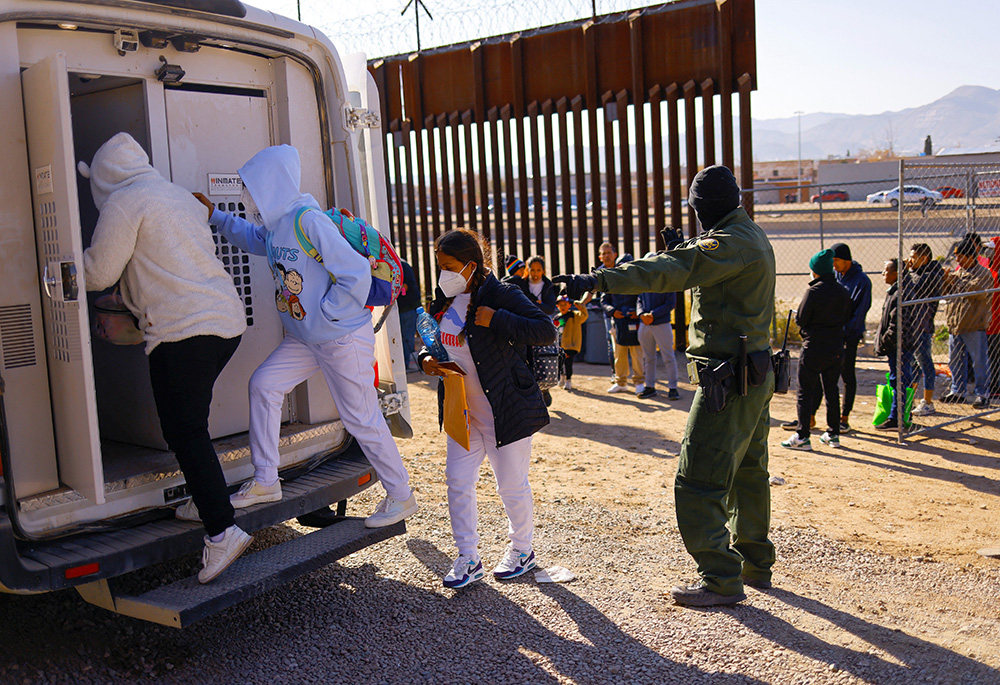
Migrants detained by U.S. Border Patrol agents after crossing into the United States from Mexico to request asylum get in a vehicle to be transferred to a detention center Dec. 19, 2022, in El Paso Texas. (OSV News/Reuters/Jose Luis Gonzalez)
Now the biggest need is on the Mexican side of the border — Reynosa across from McAllen, and Matamoros across from Brownsville — where would-be migrants wait in deplorable conditions for an immigration hearing under the public health policy Title 42 (colloquially dubbed "Remain in Mexico"), which limited immigration during the pandemic.
Before the policy, hundreds of migrants would arrive at the Humanitarian Respite Center a day. Now, the sisters say, it depends on the day and time: A recent visit found a few dozen migrants arriving, but across the border, tent cities house up to 2,000 migrants waiting for permission to cross.
"They have little water, little food," Mata said. "Most of the time it's not enough."
Anderson said that while thousands of people are in the encampments, where they are relatively safe, many more are on the streets.
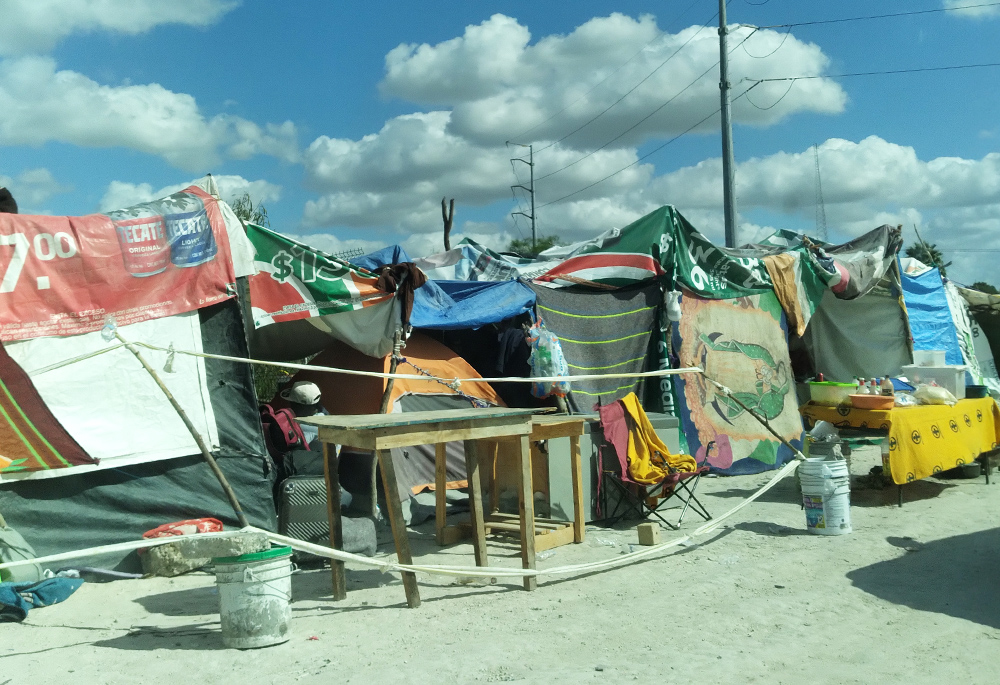
A tent city in Reynosa, Mexico, where thousands of people are waiting to cross the border into the United States to apply for asylum. Hundreds of sisters volunteered there, leading to a handful moving to the area permanently. (Courtesy of Immaculate Heart of Mary Sr. Rose Kuhn)
"They're living in tents or they hang blankets like a tent on top of something," she said. "The garbage that is along the side of the road — when it comes to hygiene, forget it."
Mata is originally from Mexico and volunteered for the mission to help in any way she can.
"It's an overwhelming reality that they live," she said. "They live in subhuman conditions. … You can see the pain in their faces, how stressed they are, how their mental health is at risk."
Mata said she is grateful for the opportunity to serve, but it takes an emotional toll: "In these people I can see my own people," she said. "For me, this is a very heavy issue. I feel very powerless. This is too big."
Anderson and Mulderick said the fears over ending Title 42 are unfounded, with Mulderick pointing out that while there may be a rush of migrants when the policy ends, it is only because of the bottleneck caused by the policy, and Anderson adding that the policy was a failure.
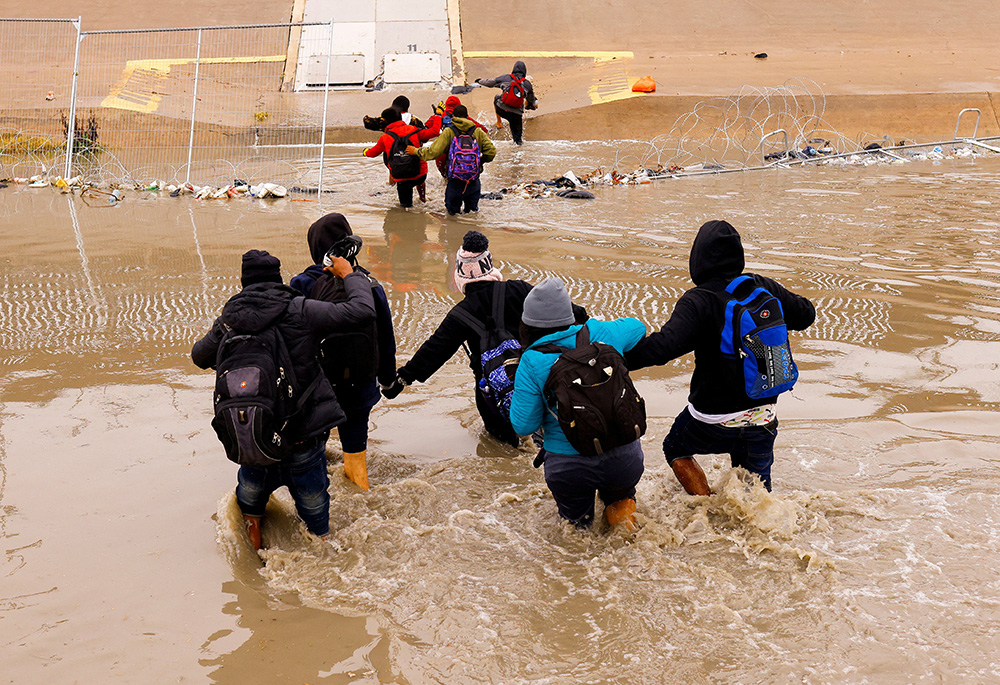
Asylum-seeking migrants are pictured crossing the Rio Bravo river from Ciudad Juarez, Mexico, the border between the United States and Mexico, to request asylum Jan. 2 in El Paso, Texas. (OSV News/Reuters/Jose Luis Gonzalez)
"Here in the United States, we had this idea that if we keep them in Mexico with this policy, they will turn around and go home," she said. "But that's not even a possibility for them. There's no home for them to return to."
Even Forster, who has lived near the border for nearly six years, said she still gets overwhelmed.
"A lot of my work lately is just seeing the chaos and anxiety and anger, and listening to the people and praying,” Forster said. "Two to three hours at a time is what I can sustain — it is emotionally overwhelming. And if it is overwhelming for me in such a short time, imagine what it's like day-to-day for the immigrants themselves."
Dumonceaux said the only way to deal with arriving in a tent city of thousands of people in need is to tighten your focus.
"It comes down to finding a small group of people in one spot, or a single family. … Seek out whichever person is willing to talk to us," she said. "Pay attention to their children — you can imagine the trauma in the children is even greater than for the adults. Children seem resilient, but you can see they're overwhelmed."
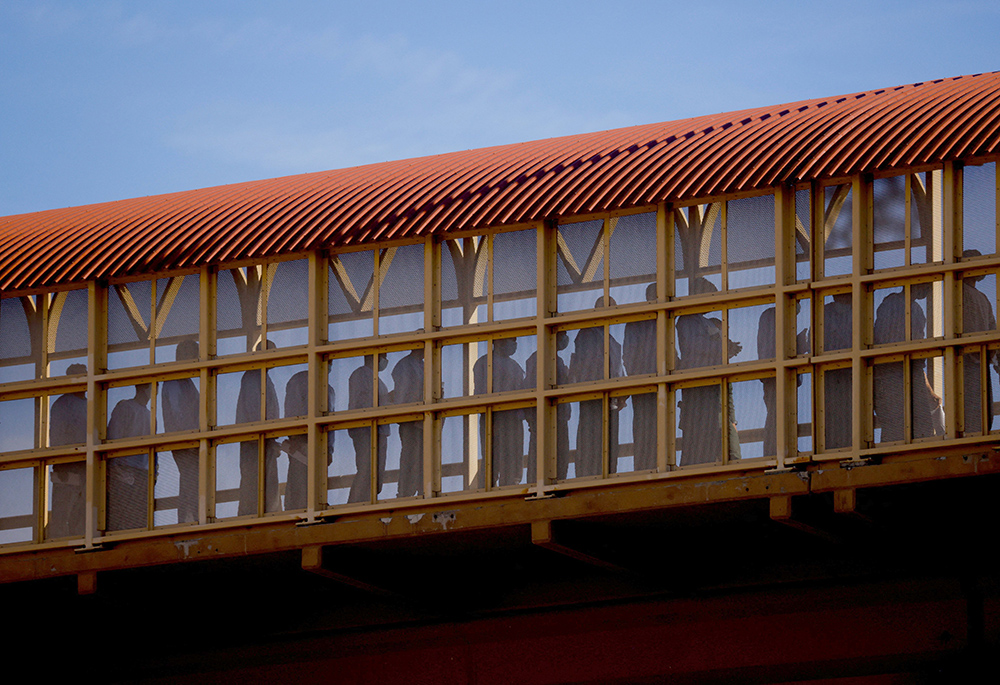
U.S. Border Patrol agents escort migrants through the Lerdo Stanton International Border Bridge Dec. 14, 2021, near El Paso, Texas, to be returned to Mexico to continue with their asylum application. (OSV News/Reuters/Jose Luis Gonzalez)
But the sisters have found they can still help, even if they can't face the desperate crowds. There is a parish in Mission, Texas, that prepares a meal once a week that is taken across the border, and the sisters often volunteer to help with that project, or they go to the Humanitarian Respite Center.
Dumonceaux said her congregation has been working at the border for more than a decade, when sisters worked in a parish that served immigrants, so their presence is nothing new.
"We're part of a lineage," she said.
Kuhn said despite the emotional toll, the sisters get back more than they give.
"Friends and other sisters in our community say, 'Oh, it's wonderful the work that you're doing,' but we are so blessed by it," she said. "We are so blessed in this work."





